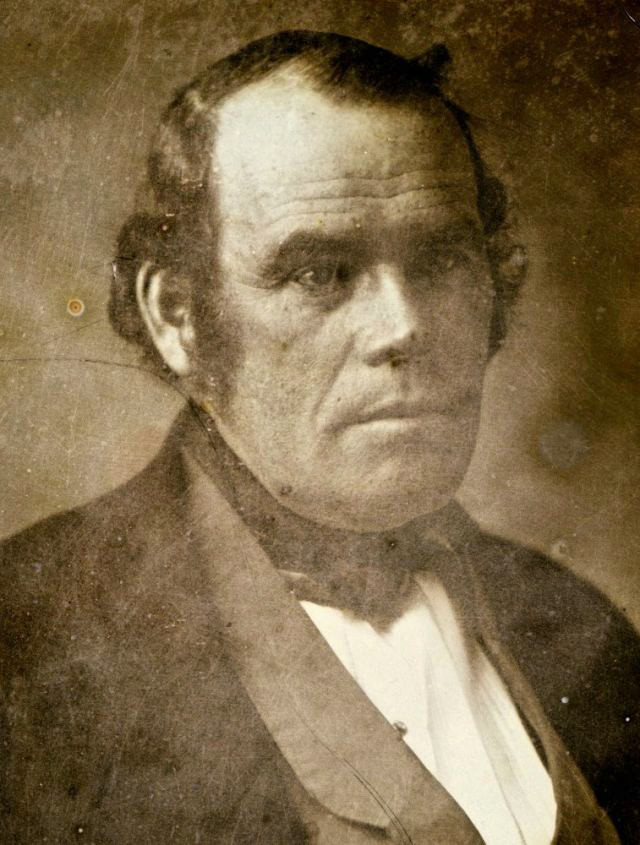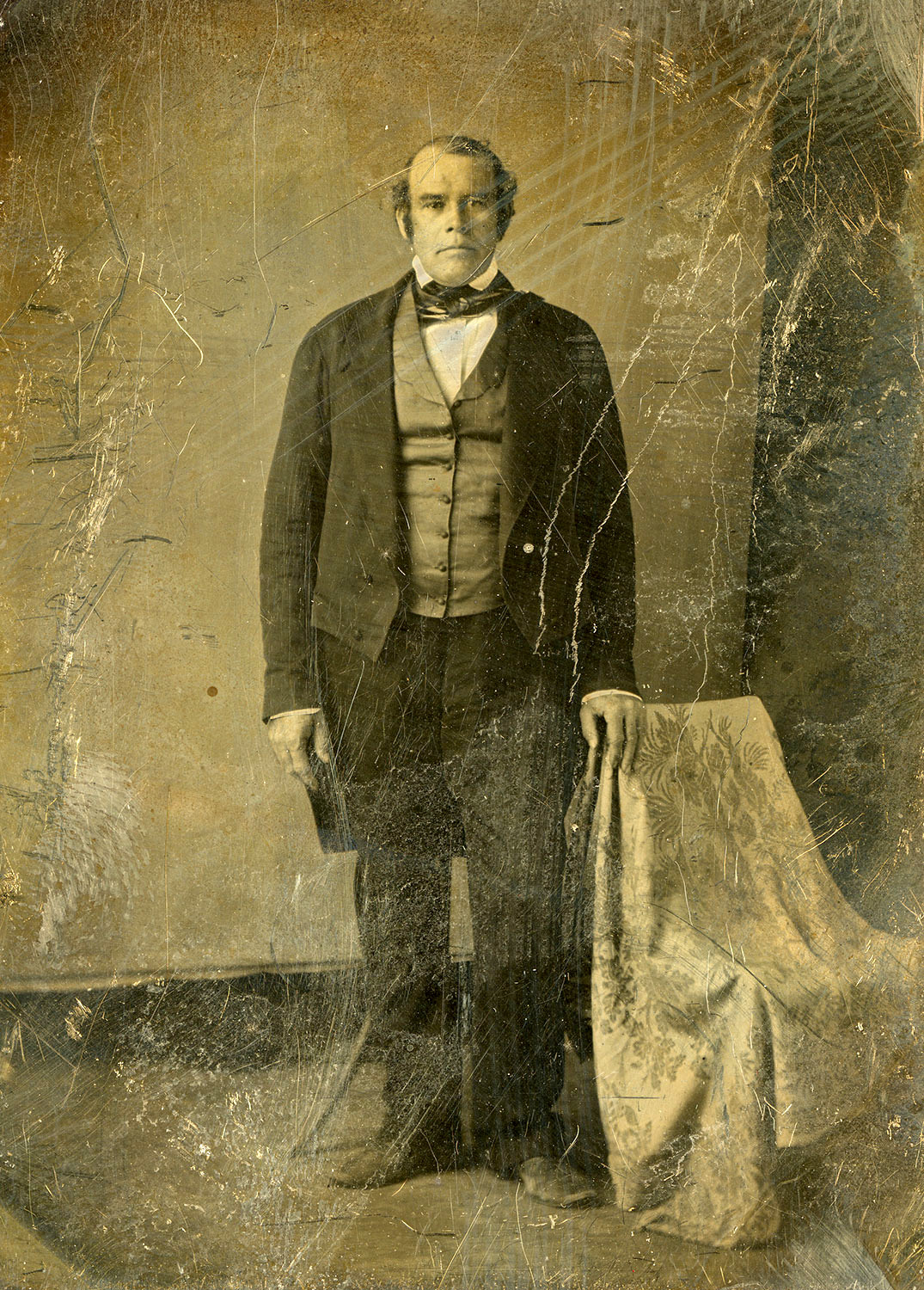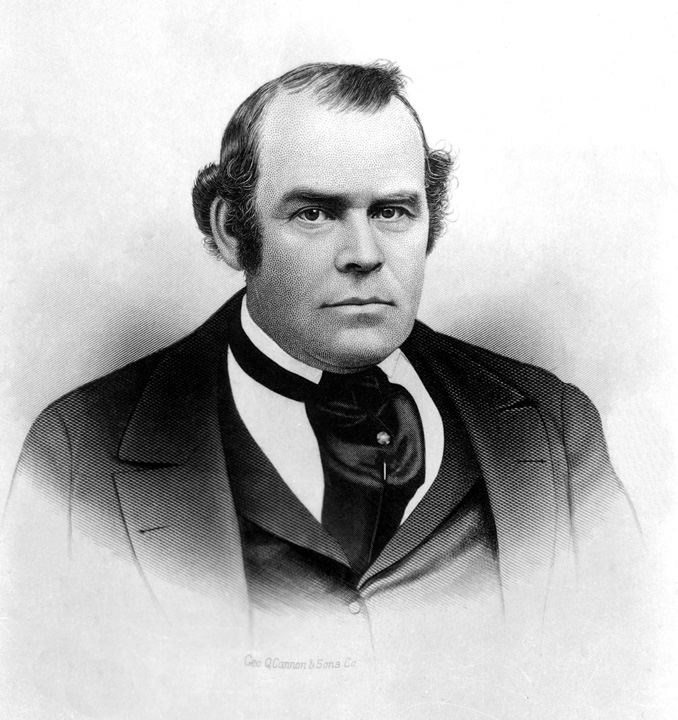Parley P. Pratt
(1807-1857)



By Susan Easton Black
Parley loved to read. “If I worked hard, a book was in my hand in the morning. . . . A book at evening . . . a book at every leisure moment of my life,” he wrote.1 In Western New York, a Baptist deacon told him about a new book— “a very strange book!” Parley read the strange book—the Book of Mormon, He wrote, “I read all day: eating was a burden, I had no desire for food; sleep was a burden when the night came, for I preferred reading to sleep. . . . I esteemed the Book, or the information contained in it, more than all the riches of the world.”2
In September 1830 Parley was baptized by Oliver Cowdery. Within a month of his baptism, he was ordained an elder in the Melchizedek priesthood and called to be a missionary to the Lamanites (see D&C 32:1-2). With companions Oliver Cowdery, Peter Whitmer Jr., and Ziba Peterson, Parley shared news of the Book of Mormon from Buffalo to Ohio. His news caused such excitement in the rural community of Kirtland, Ohio that “people thronged us night and day, insomuch that we had no time for rest and retirement.”3 After baptizing over 120 believers in the Book of Mormon, Parley and his companions proceeded onto Independence, Missouri. Although they preached to three Indian tribes—Cattaraugus, Wyandot, and Delaware—there is no record that these missionaries baptized any Native Americans.
Parley served other missions for the Church before being called to be a recruiting officer for Zion’s Camp in February 1834 (see D&C 103:30). The most remembered experience of Parley in Zion’s Camp was when he was sleeping in the day and heard a loud voice exclaim, “Parley, it is time to be up and on your journey.” He related the incident to the Prophet Joseph Smith, who told him that was the voice of “the angel of the Lord who went before the camp.”4
In February 1835 Parley was ordained an Apostle of the Lord Jesus Christ. In the blessing given him on that occasion, the Lord was petitioned to “increase [Parley’s] love for thee and for thy cause: increase his intelligence, communicate to him all that wisdom, that prudence and that understanding which he needs as a minister of righteousness, and to magnify the apostleship whereunto he is called.”5
Parley magnified his apostleship by serving missions in the Eastern States and Canada before settling in Far West, Missouri. Although he was surrounded by Latter-day Saints, on October 30, 1838 just outside the community he was taken captive by the Missouri militia. The Prophet comforted Parley and the other captives by saying, “Be of good cheer, brethren, the word of the Lord came to me last night that our lives should be given us, and that whatever we may suffer during this captivity, not one of our lives should be taken.”6
Parley was imprisoned in Independence and Richmond, Missouri. After a mock hearing in Richmond, he was sentenced to remain in Richmond for the alleged crime of murder. Parley wondered aloud, “Shall I ever be at liberty again?” At that moment his wife, Thankful Pratt, who had died two years before, appeared and assured him that he would escape.7
On Independence Day July 4, 1839 Parley and fellow Latter-day Saint prisoners hung a flag from a jail window with the word “liberty” written in large letters. The flag caused much merriment for those unaware the prisoners were planning an escape. After overpowering the jailor, the prisoners separated and ran in different directions. Parley was joyous to be free and said aloud, “Thank God for this hour, it is the happiest of my life, I am free, although lost in the wilderness, and if I cannot find myself, thank God nobody else can find me.”8
After days of wandering in Missouri, Parley crossed the Mississippi River to reach safety in Quincy, Illinois. It was there he saw the Prophet Joseph who had also escaped from imprisonment: “Neither of us could refrain from tears as we embraced each other once more as free men. He blessed me with a warmth of sympathy and brotherly kindness which I shall never forget.”9
Parley was not one to sit around and recall past wrongs. By 1841 he was serving a mission in England and publishing the Millennial Star. While serving another mission in the states, he was “constrained by the Spirit to start prematurely for home.” As he traveled toward Nauvoo, Illinois, he learned of the deaths of Joseph and Hyrum Smith: “I felt so weighed down with sorrow and the powers of darkness that it was painful for me to converse or speak to any one, or even to try to eat or sleep. I really felt that if it had been my own family who had died, and our beloved Prophet been spared alive, I could have borne it. . . . I had loved Joseph with a warmth of affection indescribable.”10
As he continued his journey toward Nauvoo, Parley wondered, “How shall I meet the aged and widowed mother of these two martyrs? How shall I meet an entire community bowed down with grief and sorrow unutterable?” He received an answer to his questions from the Lord: “Lift up your head and rejoice; for behold! it is well with my servants Joseph and Hyrum. . . . Go and say unto my people in Nauvoo, that they shall make no movement in Church government to reorganize or alter anything until the return of the remainder of the Quorum of the Twelve.”11
When the Twelve returned to Nauvoo, Parley was supportive of Brigham Young’s leadership. He assisted those who were exiting from Nauvoo and journeying to the Salt Lake Valley. He would go on to serve a General Mission to the Pacific, which took him to islands in the Pacific Ocean and to South America. His final mission was to the Southern States. Near Van Buren, Arkansas, Parley was murdered in May 1857 at age 50.
1. Parley P. Pratt, Autobiography of Parley P. Pratt, ed. Parley P. Pratt Jr. (Salt Lake City: Deseret Book, 1985), p. 2.
2. Ibid., pp. 20, 2.
3. Ibid., p. 36.
4. Ibid., p. 94.
5. Ibid., p. 97.
6. Ibid. p. 164.
7. Ibid., pp. 204-205.
8. Ibid., pp. 210-211.
9. Ibid., pp. 253-254.
10. Ibid., pp. 292-293.
11. Ibid., pp. 293-294.
